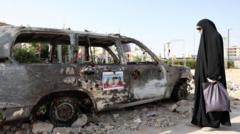As gunfire and military movements increase along the India-Pakistan border, the people of Pakistan express a unified desire for peace, prioritizing economic stability over conflict.
Tensions Rise in Pakistan Amid Calls for Peace

Tensions Rise in Pakistan Amid Calls for Peace
Amidst military preparations and political rhetoric, the public is weary of war and yearns for stability.
As military convoys advance toward the Indian border and fighter jets buzz overhead, a chorus of warnings about an impending conflict fills the airwaves in Pakistan. Yet, the sentiments on the streets and campuses reflect a stark contrast to the escalating war talk of national leaders. Many citizens in this South Asian nation are united in their belief that war is the last thing they need as they grapple with economic challenges and political discontent.
The Pakistani public finds itself at a crossroads where the fear of military confrontation with India mingles with the fatigue of daily hardships. Conversations in homes and universities increasingly pivot from war strategies to pressing socio-economic issues like inflation and unemployment. Tehseen Zahra, a 21-year-old student from Islamabad, shared her unease about the heightened war rhetoric, saying, “We already have too many problems. We need peace, not more trouble.”
Despite the authoritative declarations of strength from political leaders, there lies a deep-seated weariness among citizens regarding the prospect of conflict. The public's focus has shifted toward obtaining stability rather than engaging in a violent showdown with their neighbor. With the political climate feeling increasingly unrepresentative, the overwhelming desire remains for dialogue over weapons.
The landscape in Pakistan is growing increasingly complex as military posturing clashes with public opinion, culminating in a nation yearning for peace amidst a backdrop of potential war. As tensions mount near the border, the collective voice is clear: Pakistanis want resolution and security rather than escalating conflict.
The Pakistani public finds itself at a crossroads where the fear of military confrontation with India mingles with the fatigue of daily hardships. Conversations in homes and universities increasingly pivot from war strategies to pressing socio-economic issues like inflation and unemployment. Tehseen Zahra, a 21-year-old student from Islamabad, shared her unease about the heightened war rhetoric, saying, “We already have too many problems. We need peace, not more trouble.”
Despite the authoritative declarations of strength from political leaders, there lies a deep-seated weariness among citizens regarding the prospect of conflict. The public's focus has shifted toward obtaining stability rather than engaging in a violent showdown with their neighbor. With the political climate feeling increasingly unrepresentative, the overwhelming desire remains for dialogue over weapons.
The landscape in Pakistan is growing increasingly complex as military posturing clashes with public opinion, culminating in a nation yearning for peace amidst a backdrop of potential war. As tensions mount near the border, the collective voice is clear: Pakistanis want resolution and security rather than escalating conflict.






















